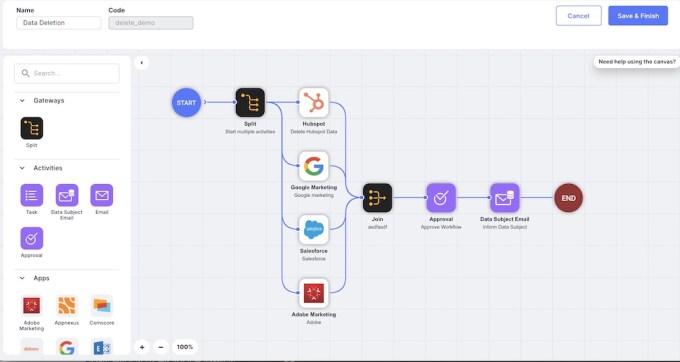On the heels of Jumio announcing a $150 million injection this week to continue building out its AI-based ID verification and anti-money laundering platform, another startup in the space is levelling up. Feedzai, which provides banks, others in the financial sector, and any company managing payments online with AI tools to spot and fight fraud — its cornerstone service involves super-quick (3 millisecond) checks happening in the background while transactions are being made — has announced a Series D of $200 million. It said that the new financing is being made at a valuation of over $1 billion.
The round is being led by KKR, with Sapphire Ventures and strategic backer Citi Ventures — both past investors — also participating. Feedzai said it will be using the funds for further R&D and product development, to expand into more markets outside the U.S. — it was originally founded in Portugal but now is based out of San Mateo — and towards business development, specifically via partnerships to integrate and sell its tools.
One of those partners looks to be Citi itself:
“Citi is committed to advancing global payments anchored on transparency, efficiency, and control, and our partnership with Feedzai is allowing us to provide customers with technology that seamlessly balances agility and security,” said Manish Kohli, global head of Payments and Receivables, with Citi’s Treasury and Trade Solutions, in a statement.
This latest round comes nearly four years after Feedzai raised its Series C, a $50 million round led by an unnamed investor and with an undisclosed valuation. Sapphire also participated in that round. It has now raised some $182 million to date.
Feedzai’s funding is happening at a time when the need for fraud protection for those managing transactions online has reached a high watermark, leading to a rush of customers for companies in the field.
Feedzai says that its customers include four of the five largest banks in North America, 80% of the world’s Fortune 500 companies, 154 million individual and business taxpayers in the U.S., and has processed $9 billion in online transactions for two of the world’s most valuable athletic brands. In total its reach covers some 800 million customers of businesses that use its services.
In addition to Citibank, its customers include Fiserv, Santander, SoFi and Standard Chartered’s Mox.
While money laundering, fraud and other kinds of illicit financial activity were already problems then, in the interim, the problem has only compounded, not least because of how much activity has shifted online, accelerating especially in the last year of pandemic-driven lockdowns. That’s been exacerbated also by a general rise in cybercrime — of which financial fraud remains the biggest component and motivator.
Within that bigger trend, solutions based on artificial intelligence have really emerged as critical to the task of identifying and fighting those illicit activities. Not only is that because AI solutions are able to make calculations and take actions and simply process more than non-AI based tools, or humans for that matter, but they are then able to go head to head with much of the fraud taking place, which itself is being built out on AI-based platforms and requires more sophistication to identify and combat.
For banking customers, Feedzai’s approach has been disruptive in part because of how it has conceived of the problem: It has built solutions that can be used across different scenarios, making them more powerful since the AI system is subsequently “learning” from more data. This is in contrast to how many financial service providers had conceived and tackled the issue in the past.
“Until now banks have used solutions based on verticals,” Nuno Sebastiao, co-founder and CEO of Feedzai, said in the past to TechCrunch. “The fraud solution you have for an ATM wouldn’t be the same fraud solution you would use for online banking which wouldn’t be the same fraud solution you would have for a voice call center.” As these companies have refreshed their systems, many have taken a more agnostic approach like the kind Feedzai has built.
The scale of the issue is clear, and unfortunately also something many of us have experienced firsthand. Feedzai says its data indicates that the last quarter of 2020 shows consumers saw a 650% increase in account takeover scams, a 600% in impersonation scams and a 250% increase in online banking fraud attacks versus the first quarter of 2020. (Those periods are, essentially, before-pandemic and during-pandemic comparisons.)
“The past 12 months have accelerated the world’s dependency on electronic financial services – from online banking to mobile payments, and in turn have increased fraud and money laundering activity. Our services are in more demand than ever,” said Sebastiao in a statement today.
Indeed, yesterday, when I covered Jumio’s $150 million round, I said I wouldn’t consider its funding to be an outlier (even though Jumio made clear it was the largest funding to date in its space): the fast follow from Feedzai, with an even higher amount of financing, really does underscore the trend at the moment.
In addition to these two, one of Feedzai’s biggest competitors, Kount, was acquired by credit ratings giant Equifax earlier this year for $640 million to move deeper into the space. (And related to that field, in the area of identity management, which goes hand-in-hand with tools for laundering and fraud, Okta acquired Auth0 for $6.5 billion.)
Other big rounds for startups in the wider space have included ForgeRock ($96 million round), Onfido ($100 million), Payfone ($100 million), ComplyAdvantage ($50 million), Ripjar ($36.8 million) Truework ($30 million), Zeotap ($18 million) and Persona ($17.5 million).
KKR’s involvement in this round is notable as another example of a private equity firm getting in earlier with venture rounds with fast-scaling startups, similar to Great Hill’s investment in Jumio yesterday and a number of other examples. The firm says it’s making this investment out of its Next Generation Technology Growth Fund II, which is focused on making growth equity investment opportunities in the technology space.
“Feedzai offers a powerful solution to one of the biggest challenges we are facing today: financial crime in the digital age. Global commerce depends on future-proof technologies capable of dealing with a rapidly evolving threat landscape. At the same time, consumers rightfully demand a great customer experience, in addition to strong security layers when using banking or payments services,” said Stephen Shanley, managing director at KKR, in a statement
“We believe Feedzai’s platform uniquely meets these expectations and more, and we are looking forward to working with Nuno and the rest of the team to expand their offering even further,” added Spencer Chavez, principal at KKR.

Powered by WPeMatico


